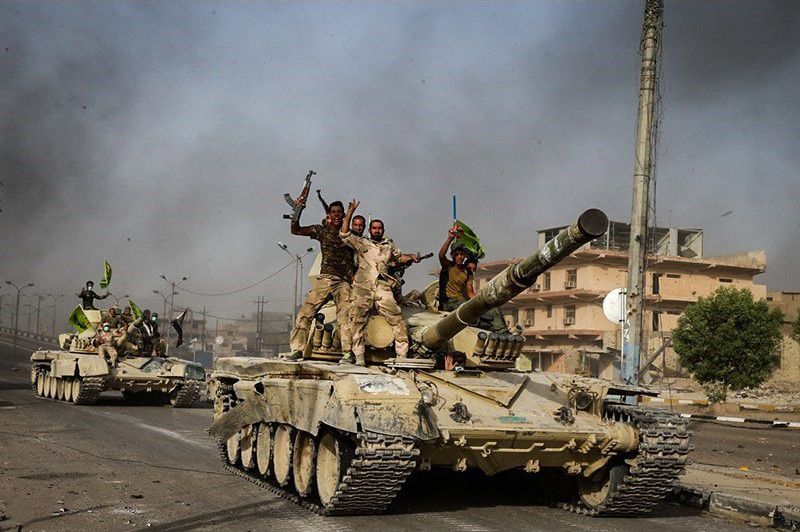
Accountability for Sectarian and Ethnic Violence in the Anti-ISIS Campaign
On June 28, the government of Iraq announced victory over the Islamic State of Iraq and al Sham (ISIS) in the city of Fallujah. ISIS had occupied Fallujah, and the Iraqi military with the help of Iraqi Shia militias took back the city, liberating civilians who were trapped under ISIS control. Celebrations among civilians, however, were short lived. According to the Anbar Provincial Council, 643 civilians have gone missing. They are reportedly held by the Shia militia group Kataaib Hezbollah and are feared dead or in serious condition. In early June, Amnesty International called on the Iraqi government to reign in Shia militia forces fighting alongside the army amid reports that the militias were torturing and abusing refugees fleeing ISIS and the fighting in Fallujah. Similarly, in Syria, a US-backed anti-ISIS offensive in Manbij has resulted in reports of Kurdish-led forces committing atrocities against civilian populations. News of the atrocities in Iraq and Syria have been circulated through ethnically-charged and sectarian media coverage in the Middle East which has heightened already rising tensions in the region and has played directly into ISIS’s “us vs. them” ideology.
In both Iraq and Syria, there has been a complete lack of accountability despite the reports of abuse. Although the Iraqi government has responded to mounting international criticism by opening an investigation into the allegations of disappearances, killings, and torture in Anbar Province, it is yet to be seen whether the investigations will lead to arrests or a change in behavior. Meanwhile in Syria, the Kurdish People’s Protection Units (YPG) in Syria have not allowed for independent investigations or reprimand. What is needed is proper training on civilian protection and transparent systems of accountability when allegations of abuse arise. Otherwise, civilians might turn to extremist groups for protection, the cycle of revenge attacks between ethnic and religious groups will continue, and the resulting sectarian rhetoric will be a mounting obstacle to reconciliation and peace.
While a majority of Syrians say they do not see themselves or their society as sectarian, traditional and social media are often used to intentionally fuel sectarian divisions. Media outlets often portray attacks as sectarian-driven in order to propagate their viewpoints. Depending on the media source, events in the Syrian conflict are framed as either an Alwaite dictator oppressing the Sunni majority or the Alawite regime fending off a terrorist insurgency intent on wiping out religious minorities. Social media follows a similar vein as well. Unfortunately events in Syria and neighboring countries, like the recent abuses in Fallujah, play into this narrative; media reports and armed groups seem to feed off of each other, creating cycles that drive wedges in Syrian society.
Instead of addressing this growing problem, regional leaders and the international community prefer to ignore the sectarian nature of the conflict. Yet, it seems impossible to imagine a reconciliation or transitional justice process that does not tackle the resulting harm of Syria’s ethnic and sectarian-based violence and rhetoric. In fact, neighboring Lebanon is a striking example of the dangers of turning a blind eye to ethnic and religious violence that occur during conflict. Lebanon’s October 1989 Ta’if Agreement entrenched confessional politics (whereby political power is formally distributed according to religious affiliations) and resulted in a General Amnesty Law that stated la ghalib le maghlub (there are no winners and no losers in the war).
The Amnesty Law encouraged Lebanese people to forget the divisions of the conflict in the hope that the aura of silence would lead to peace and reconciliation among communities. But state-sponsored amnesia has only benefited the political elite whose crimes during the civil war were pardoned and who continue to play roles in government. The rest of the country is still coping with the effects of the war, and identity politics continue to cause low-level conflicts between communities which have escalated since 2011 as a result of the unrest in Syria. Rather than leading to reconciliation, Lebanon’s policy of forgetting has instead sewn resentment. Seeing this first-hand, Lebanese civil society groups have continuously advocated for meaningful accountability to address the harms of the past as the only option for sustainable peace.
Whether in Lebanon, Iraq, or Syria, the memories of recent conflict based on ethnic and sectarian divisions will inevitably build off of the collective memory of historical repression and perceived humiliations. These memories will avalanche and increase sectarian schisms unless there is a dramatic break from the past that provides the space for justice for victims of violence regardless of identity and allows disparate ethnic and religious groups to engage with accountability processes in a way that addresses the interconnected harm caused by cycles of abuses and conflict. The international community, therefore, must not tolerate sectarianism and ethnic hatreds for the sake of defeating ISIS. The focus should not be on expediency, but on ensuring that there are systems in place for civilian protection and internal accountability processes within anti-ISIS coalitions. Because the future of Syria depends on the ability of communities to live together in a future state, preferably not one built on the confessional politics that have stymied both Lebanon and Iraq.